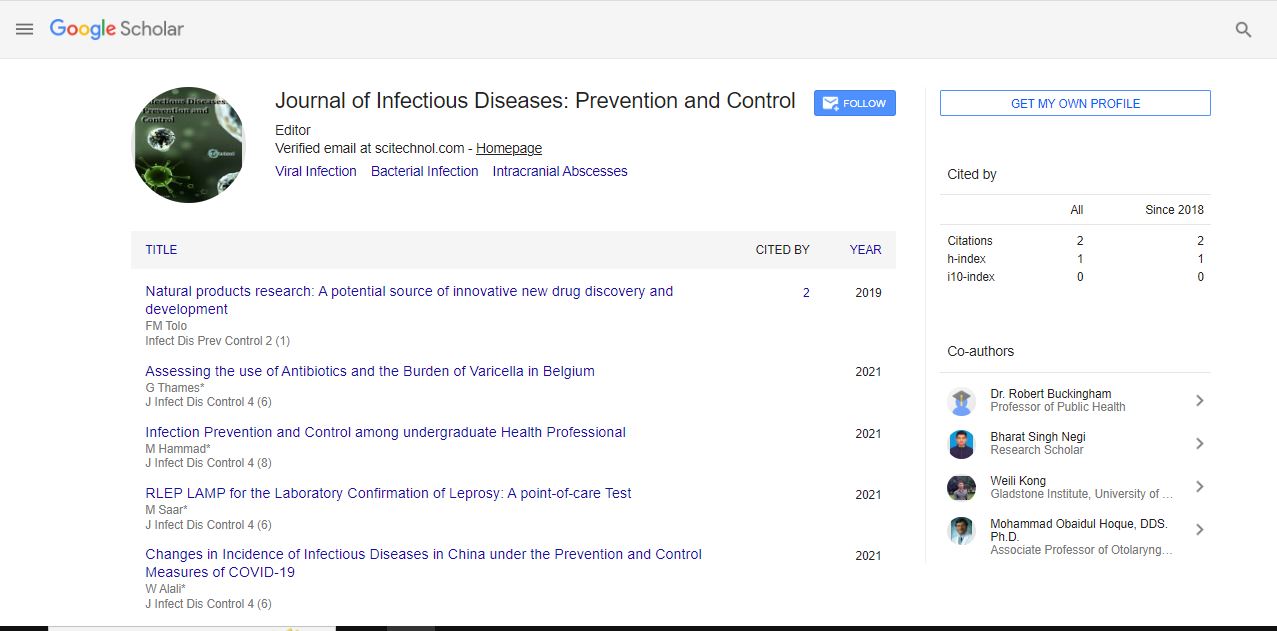Opinion Article, Vol: 6 Issue: 1
Anti-Microbial Peptides for the Treatment of Antibiotic-Resistant Bacterial Illnesses
Nicolas Ajkay*
Department of Surgery, University of Louisville School of Medicine, Louisville, KY, USA
*Corresponding Author: Nicolas Ajkay
Department of Surgery, University of
Louisville School of Medicine, Louisville, KY, USA
E-mail: ajkay@louisville.edu
Received date: 21 February, 2023, Manuscript No. IDPC-23-93454;
Editor assigned date: 23 February, 2023, Pre QC No. IDPC-23-93454(PQ);
Reviewed date: 07 March, 2023, QC No. IDPC-23-93454;
Revised date: 14 March, 2023, Manuscript No. IDPC-23-93454(R);
Published date: 24 March, 2023, DOI: 10.36648/idpc.5.2.122
Citation: Ajkay N (2023) Anti-Microbial Peptides for the Treatment of Antibiotic-Resistant Bacterial Illnesses. Infect Dis Prev Control 6:1.
Description
Anti-Microbial Peptides (AMPs) are short proteins that are found in a variety of organisms, including bacteria, fungi, plants, and animals. They are part of the innate immune system and provide a first line of defense against pathogens. AMPs have broad-spectrum activity against bacteria, viruses, fungi, and parasites. They can disrupt microbial membranes, inhibit cell wall synthesis, and interfere with cellular metabolism. This makes them effective against a wide range of pathogens, including antibiotic-resistant strains. AMPs have several advantages over traditional antibiotics. They have a rapid onset of action, are less likely to develop resistance, and have a lower risk of toxicity. They also have the potential to be used in combination with other antibiotics to enhance their efficacy. Research into AMPs is ongoing, with many new peptides being discovered and developed for clinical use. Some AMPs are already in clinical trials for the treatment of infections, and there is potential for their use in other areas, such as cancer therapy and wound healing. Overall, AMPs are a promising area of research in the fight against infectious diseases, and have the potential to offer new and effective treatments for a range of conditions. Antibiotic resistance is a phenomenon where bacteria evolve to become resistant to antibiotics that were once effective against them. This occurs when bacteria undergo genetic mutations or acquire resistance genes from other bacteria. When antibiotics are used to treat bacterial infections, the antibiotics kill the susceptible bacteria, but any bacteria that are resistant to the antibiotics survive and reproduce, leading to the emergence of antibiotic-resistant strains. Antibiotic resistance is a significant public health threat because it can lead to more severe and prolonged infections, increased healthcare costs, and higher mortality rates. It also makes it more challenging to treat infectious diseases and can lead to the development of new antibiotic-resistant strains.
The treatment of antibiotic-resistant bacterial illnesses is a complex and challenging task. The first step is to identify the specific bacteria causing the infection and determine its antibiotic susceptibility profile. This involves performing culture and sensitivity tests to determine the most effective antibiotic. If the bacteria are resistant to multiple antibiotics, treatment options become limited. In some cases, combination therapy with two or more antibiotics may be effective. However, this approach should be carefully considered to avoid promoting the development of further resistance. Alternative approaches to treating antibiotic-resistant bacterial illnesses include the use of bacteriophages, which are viruses that specifically target and kill bacteria, and the use of Antimicrobial Peptides (AMPs), which are naturally occurring peptides that can kill a wide range of bacteria. Another approach is to use immunotherapy to stimulate the immune system to fight the infection. This can be done by using monoclonal antibodies, which are laboratory-produced antibodies that target specific bacterial antigens. In addition to these approaches, it is also important to implement measures to prevent the spread of antibioticresistant bacteria, such as practicing good hand hygiene, using antibiotics only when necessary and as prescribed, and developing new antibiotics and alternative therapies.
Overall, the treatment of antibiotic-resistant bacterial illnesses requires a multifaceted approach that involves a combination of different strategies to effectively control and manage these infections.
 Spanish
Spanish  Chinese
Chinese  Russian
Russian  German
German  French
French  Japanese
Japanese  Portuguese
Portuguese  Hindi
Hindi 